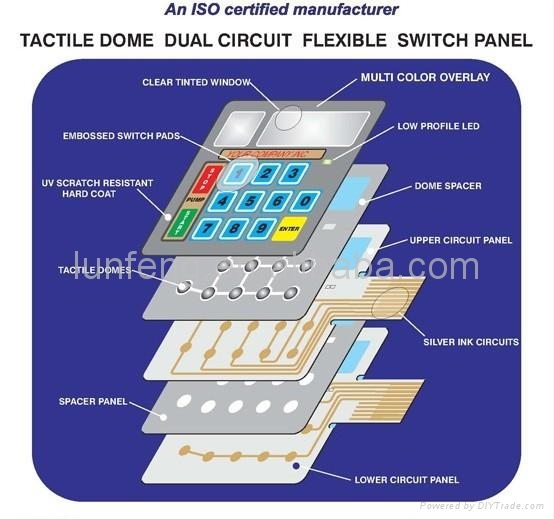Comprehending the Importance of Membrane Switches in Interface
Membrane switches are indispensable parts in the layout of efficient user interfaces, promoting not only capability however also boosting aesthetic allure and user communication. Their special features, such as resistance to ecological factors and customizable styles, make them ideal for a varied range of applications throughout multiple sectors. As we discover the future trends and different advantages related to Membrane innovation, it becomes clear that these buttons are greater than simply elements; they stand for a convergence of development and usefulness. The implications of this modern technology on customer experience deserve checking out further.
What Are Membrane Switches?

The spacer layer, which consists of glue properties, enables for the splitting up of the circuit layer from the overlay, making certain that the switch stays in a non-activated state till pushed. When stress is put on the overlay, it presses the spacer layer, connecting the space and completing the circuit in the underlying layer. This style not only minimizes the physical room needed for typical mechanical buttons yet also improves the toughness of the tool, as Membrane switches are typically resistant to dust, wetness, and other environmental factors.
Frequently located in applications varying from consumer electronics to medical devices, Membrane buttons are integral to modern innovation, providing a reliable and straightforward user interface that lines up with contemporary layout demands.
Advantages of Membrane Buttons
While numerous button innovations exist, Membrane Switches offer distinct benefits that make them specifically desirable in various applications. Among the main advantages of Membrane switches is their small design, which enables space-saving executions in gadgets where realty is restricted. Their thin account not only boosts aesthetic allure yet also helps with light-weight construction.
An additional substantial benefit is their resistance to environmental factors. Membrane buttons are usually sealed versus wetness, dirt, and contaminants, making them ideal for use sought after environments, such as clinical tools and industrial tools. This toughness prolongs the lifespan of the switch, lowering maintenance prices and boosting reliability.
In addition, Membrane switches can be tailored to satisfy details layout needs, incorporating distinct graphics and shades that boost user interaction. Their tactile comments alternatives can also be tailored to supply a satisfying user experience. Additionally, Membrane switches are economical, especially in high-volume applications, as they can be produced effectively.
Applications in Various Industries

In the customer electronic devices field, Membrane buttons are prevalent in view devices such as microwaves, washing equipments, and remote controls. Their tactile responses and aesthetic choices boost customer experience while offering a smooth, modern-day appearance. Additionally, automotive suppliers use Membrane switches in control panel controls and infotainment systems, where try this space is limited, and individual involvement is critical.
Moreover, the commercial market leverages Membrane buttons in control panels for equipment and devices, permitting user-friendly operation in usually extreme atmospheres. Their resistance to chemicals and moisture guarantees durability and dependability in these applications. Generally, the versatility of Membrane Switches contributes significantly to their prevalent use, making them indispensable in numerous technological domain names.
Style Considerations for Membrane Buttons

When developing Membrane buttons, several crucial considerations need to be taken into account to make sure optimal performance and individual experience. The selection of materials is essential; choosing durable, high-grade substratums can enhance the button's long life and resistance to environmental factors such as dampness and temperature variations.
Second of all, the design of the visuals overlay should focus on quality and convenience of use. Symbols and text need to be clear, and the format ought to facilitate instinctive interaction (membrane switches). Furthermore, responsive comments is crucial; including a tactile dome or other mechanisms can boost the individual experience by giving physical confirmation of activation
An additional essential factor is the switch's electric efficiency. Designers should guarantee that the conductive traces are effectively developed to decrease resistance and avoid signal disturbance. This involves important source examining the required actuation force and making sure compatibility with the digital components they will interface with.

Future Patterns in Membrane Innovation
As innovation remains to advancement, Membrane switches are poised to evolve significantly, driven by advancements in products and manufacturing methods. One arising trend is the consolidation of sophisticated materials, such as adaptable substrates and conductive inks, which improve durability and decrease the total weight of Membrane switches. These products not only improve the tactile feedback but likewise permit the layout of switches that can withstand harsher ecological problems.
Additionally, the integration of touch-sensitive modern technologies is transforming traditional Membrane Switches into more interactive user interfaces. Capacitive touch sensors embedded within Membrane switch panels can offer an extra instinctive and responsive user experience, aligning with the expanding demand for sleek, contemporary layouts in consumer electronic devices.
Furthermore, innovations in printing methods, such as digital and 3D printing, enable quick prototyping and personalization of Membrane buttons. This flexibility permits manufacturers to respond faster to market demands and consumer preferences.
Lastly, sustainability is becoming a considerable focus, with manufacturers exploring eco-friendly products and procedures. As these patterns unravel, the future of Membrane technology guarantees boosted capability, visual charm, and environmental responsibility, strengthening their duty in sophisticated interface across numerous markets.
Verdict
In verdict, Membrane Switches stand for a vital element in the design of individual interfaces, combining performance with visual adaptability. As developments in modern technology continue, the development of Membrane switches is expected to more fine-tune customer interfaces, driving development and boosting usability in a progressively intricate technological landscape.
Membrane buttons are integral elements in the layout of effective user interfaces, assisting in not only functionality yet likewise improving visual appeal and user interaction.Membrane Switches serve as an essential component in different individual interfaces, promoting a seamless interaction between individuals and digital gadgets.While various switch innovations exist, Membrane Switches deal distinctive advantages that make them especially desirable in various applications.Additionally, Membrane buttons can be tailored to meet certain layout needs, including unique graphics and colors that enhance individual interaction.In verdict, Membrane Switches represent a crucial element in the style of individual interfaces, integrating performance with aesthetic flexibility.